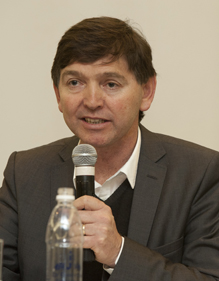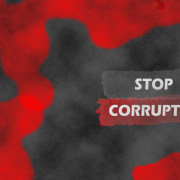|
Getting your Trinity Audio player ready...
|
 Steven Powell, the head of forensics at law firm Edward Nathan Sonnenbergs, calls on government to show genuine political will for tackling corruption in South Africa by setting up an independent graft-fighting unit.
Steven Powell, the head of forensics at law firm Edward Nathan Sonnenbergs, calls on government to show genuine political will for tackling corruption in South Africa by setting up an independent graft-fighting unit.
The following was shared in his presentation at the recent Helen Suzman Foundation’s roundtable discussion on corruption:
One of the key structural issues impacting on white collar crime in South Africa is a lack of resources on both the investigative and prosecution level, Powell said.
“Corruption is an insidious evil in our country because it is like a cancer that permeates throughout the body with little evidence or symptoms of the underlying destruction that it is causing.
“Specialist skills are required to detect and treat the cancer before it pervades every sphere of public service in South Africa, hence my call for a dedicated and independent multi-disciplinary anti-corruption body.”
Drastic action needed
Powell conveyed that South Africa is again at a turning point, where if the state does not take drastic action, corruption will become endemic.
“Petty bribes are already being accepted as routine and normal. Daily newspapers are rife with reports of widespread corruption in both the public and private sectors.
“The arms deals scandal, coupled to prison sentences for the former commissioner of police Jackie Selebi and the recent termination of his replacement, Bheki Cele, who was embroiled in a R1.8-billion overspend on police accommodation has done little to bolster confidence in public sector integrity.
“These incidents, coupled to the tenderpreneurs phenomenon, and many instances of grand corruption, exposed by the public protector has created the perception that corruption is rife in South Africa at present.
“This perception has in turn, contributed to South Africa’s slide down the Transparency International corruption index by more than 20 positions in the last five years. South Africa currently occupies 64th position out of the 189 countries that participated in the Transparency International Corruption Index.”
Multi-disciplinary teams the best arsenal
Powell reiterated his call for an independent body to fight the corruption war in South Africa. “The Scorpions had their weaknesses, but the prosecutor-driven, multi-disciplinary teams comprised of lawyers, accountants, investigators and digital forensic practitioners remain the best way to address these difficult cases”.
Powell stated that in his view the demise of the Scorpions was a regressive step in the war against corruption.
“The replacement of the unit by the Hawks, which forms part of the police services, is simply not sufficiently independent or effective enough. They do good work on organised crime, but they are not the ideal solution to the corruption problem, he said.
Government needs to create a dedicated, fully independent, multi-disciplinary corruption-busting unit with sufficient resources in order to have a meaningful impact on the corruption problem in this country; this he said is the acid test as to whether government is genuinely committed to tackling corruption in South Africa.”
Powerful legislation – but not many know about it
Powell indicated that we have powerful legislation to tackle corruption in South Africa, but few people are aware of critical anti-corruption requirements in South Africa.
He said that many of the initiatives to address corruption in South Africa are not marketed effectively and consequently are not widely known.
He cited the example of Section 34 of the Prevention and Combating of Corrupt Activities Act, act 12 of 2004, which requires corruption matters to be reported to the authorities.
In terms of that section, it is a criminal offence for any person in a position of authority – who knows, or ought to have known, or suspects that an act of fraud, theft, corruption, extortion or forgery took place – not to report the incident to the South African Police Service, where the value exceeds R100 000.
This legislation is designed to compel executives, managers and business leaders who become aware of corrupt acts to report such knowledge or suspicion to the authorities; however, as conveyed above, very few people are aware of this requirement even though the failure to report carries a potential 10 year jail penalty.
Powell conveyed his frustration regarding limited public awareness that exists regarding onerous anti-corruption compliance requirements that have been introduced into South African law by the regulations to the new Companies Act which came into effect in 2011.
Regulation 43 of the new Companies Act (Act 71 of 2008) requires South African companies to establish Social and Ethics Committees which have a host of good corporate citizenship obligations.
Included, however, among those obligations is a requirement to monitor the company's progress in respect of adhering to the Organisation for Economic Cooperation and Development (OECD) recommendations on reducing corruption.
Very few people have any idea of what the OECD recommendations entail, said Powell.
Blissfully unaware
“Many companies are blissfully unaware that they are even obliged to comply with this legislation as many business leaders labour under the misapprehension that this legislation only applies to listed corporate entities in South Africa.
“Whilst it does apply to listed South African companies, it also applies to all state-owned entities such as Telkom and Eskom.
“What very few people realise is that this legislation is also applicable to medium to large enterprises.”
Powell explained that eligibility to comply to the Act is determined either by being listed entity or a state-owned entity or further by achieving a score of 500 points or more.
The criteria for scoring points is the following:
The entity is awarded one point per employee, based on the average number of employees over any two of the last five years.
The entity further scores one point per million rand in turnover, one point per million in debtor’s book, one point per million in creditors and one point for every holder of issued securities (shareholders).
Powell explained that there are accordingly a large number of unlisted companies that are also subject to these requirements.
He suggested that if government wants companies in South Africa to adhere to these onerous, but useful anti-corruption compliance requirements, it will need to take strong measures to bolster public awareness of the obligations.
“The OECD recommendations amount to extremely useful proactive anti-bribery measures which will have a positive impact on corruption levels as they require South African companies to put anti-corruption policies and procedures in place.
“They also require South African firms to develop internal controls to mitigate the risk of bribery in its business activities as well as to train its people, to discourage facilitation payments, to accurately record its transactions, and to perform due diligence on agents intermediaries business partners.
“By implementing the OECD recommendations companies will restrict opportunities for corruption to take place within their own business, thereby potentially neutralising from acting as bribe payers.
“The inclusion of the OECD recommendations on reducing corruption in the regulations to the Companies Act is a bold step which should have a positive effect on reducing corruption in our country.
“By doing so we have taken our first steps as a country down the anti-corruption compliance path which has been led by the US with its Foreign Corrupt Practices Act (FCPA), which targeted bribes paid to foreign government officials.
“Even stronger global anti-corruption legislation was promulgated by the UK in July 2011 when the British government introduced the UK Bribery Act (UKB), which targets bribes paid to foreign government officials and any other person.
“The UKBA has also introduced a new corporate offence entitled the failure by a commercial organisation to prevent bribery. What this means is that if an incident of bribery takes place and the corporate entity in which it happened, does not have anti-bribery policies and procedures in place and it has not educated its employees and agents, about not participating in acts of bribery, the company can then potentially be prosecuted and fined for failing to prevent bribery.”
Powell indicated that while the introduction of the OECD recommendations into our law via the Regulations to the Companies Act is to be welcomed, there is still much to be done.
Take note of global clampdown
“We should look at how the US and UK regulators impose heavy penalties on bribe paying companies. The penalties for failure to comply with global anti-corruption measures are significant.
“Multimillion-pound or -dollar penalties are imposed by the Department of Justice and Securities and Exchange Commission in the US, as well as by the Serious Fraud Office in the UK.
“For example in 2010 penalties of more than US$1.8-billion were imposed in respect of its FCPA breaches in the US.
“In the US, whistleblowers are incentivised; they can receive up to 25% of recovered amounts from offending companies. This has driven a culture of "self-reporting" which takes place in the US, when corporates discover corruption breaches within its own organisation.
“Many such breaches take place in subsidiaries in remote regions. The parent company is regarded as vicariously liable for the illicit activities of such subsidiaries, its agents, business partners and intermediaries,” said Powell.
“If we as a country were to emulate what the Americans and the British have recently done; in the first place the South African fiscus will be dramatically bolstered, however, secondly and more importantly corporate entities will be encouraged to create a culture of doing business ethically and at the same time they will avoid corrupt activity in order to evade robust sanctions.”







